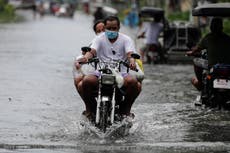Anxiety over the climate crisis is stopping people having children, study finds
Almost 60 per cent of American adults polled were also ‘very’ or ‘extremely concerned’ about the carbon footprint of having children
Your support helps us to tell the story
From reproductive rights to climate change to Big Tech, The Independent is on the ground when the story is developing. Whether it's investigating the financials of Elon Musk's pro-Trump PAC or producing our latest documentary, 'The A Word', which shines a light on the American women fighting for reproductive rights, we know how important it is to parse out the facts from the messaging.
At such a critical moment in US history, we need reporters on the ground. Your donation allows us to keep sending journalists to speak to both sides of the story.
The Independent is trusted by Americans across the entire political spectrum. And unlike many other quality news outlets, we choose not to lock Americans out of our reporting and analysis with paywalls. We believe quality journalism should be available to everyone, paid for by those who can afford it.
Your support makes all the difference.People have expressed deep-seated anxieties about the climate crisis when it comes to whether or not they will have children, amid fears that the next generation will face difficult lives in a “dying world”, according to the first academic paper of its kind on the topic.
The procreation question has become a prevalent talking point since New York congresswoman Alexandria Ocasio-Cortez asked last year if it is "ok to still have children” due to the impacts of climate change.
The new study of more than 600 adults, aged between 27 and 45, found that 96.5 per cent were “very” or “extremely” concerned about the well-being of their existing, or future, children in a world impacted by the consequences of global heating.
The findings were due to an overwhelmingly negative outlook on the future, according to researchers from the Yale-NUS College, Singapore whose results were published in the journal, Climate Change, this month.
One woman, 31, told the researchers: “Climate change is the sole factor for me in deciding not to have biological children. I don’t want to birth children into a dying world. I dearly want to be a mother but climate change is accelerating so quickly, and creating such horror already, that bringing a child into this mess is something I can’t do."
The anxiety over the climate crisis was so pronounced that 6.3 per cent of parents expressed regret about having children due to their despair over the future of the planet.
“I regret having my kids because I am terrified that they will be facing the end of the world due to climate change,” one 40-year-old teacher and mother from Minnesota, told the survey-takers.
The survey, of 607 Americans, also discovered that 59.8 per cent of those polled were “very” or “extremely concerned” about the carbon footprint of having children.
An open-ended, follow-up question discovered that many respondents were conflicted about the issue.
Most had heard of, or read summaries of, academic papers about the carbon footprint of procreation, and deemed it “compelling” enough to factor into one of their life’s biggest decisions.
One childfree, 32-year old consultant in Ohio said: “I cannot produce another person that will continue to destroy the planet, as they will inherit my first world lifestyle. I also cannot live with the feeling of responsibility that I made a decision to have a child for my own pleasure while destroying exactly what I’m fighting to save.”
Many parents and parents-to-be noted that the carbon footprint of having children had factored into them having a smaller family.
One 38-year old mother from Minnesota said: “I really didn’t think a lot about the carbon footprint of having another child, until I read something saying that the best thing you can do to reduce your carbon footprint is not reproduce. Thinking about that has influenced my decision not to have a third child."
Others did not accept the personal framing of a collective problem, the researchers found.
"I’m not going to not have a family because economic and political leaders have f***ed this up for everyone. That’s not on me as an individual and it makes me mad that under our neoliberal/individualistic framing it’s my responsibility to deny my spouse and myself that right. No, f*** that,” a 37-year old civil engineer and father in Massachusetts responded.
Younger adults expressed more concerned about the adverse impacts that the climate crisis would have on their children, compared to older people who were asked.
Both men and women showed equal concern, the anonymous study titled “Eco-reproductive concerns in the age of climate change”, found.
Professor Matthew Schneider-Mayerson, who led the study, told The Guardian: "The fears about the carbon footprint of having kids tended to be abstract and dry.
"But the fears about the lives of existing or potential children were really deep and emotional. It was often heartbreaking to pore through the responses – a lot of people really poured their hearts out.”
In a 2017 study, from researchers Seth Wynes and Kimberly A. Nicholas, estimated that the carbon footprint of a child in the developed world is 58.6 tonnes each year of CO2-equivalent emissions (tCO2e- greenhouse gases including CO2, methane and nitrous oxide).
By comparison giving up your car only reduces a person’s carbon footprint by 2.4 tCO2e annually.
And a separate poll last year by Business Insider discovered that close to 30 per cent of US adults “strongly agree, agree, or somewhat agree” that people should consider climate change when deciding to have children or not.




Join our commenting forum
Join thought-provoking conversations, follow other Independent readers and see their replies
Comments